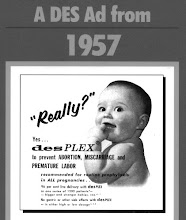
Since 1971 DES exposed Australians have borne the brunt of the negative consequences of failures to report the side effect cancer due to DES. Without having these failures to report cases, it would enable a more accurate estimation of the magnitude of the Australian DES problem and hence, greater validity and recognition to the DES issue.
From 1983 to 2001 the number of DES associated cancer cases held in data by our drug watchdog, the Therapeutic Goods Administration (TGA) strangely remained static at 4 cases, whilst the figures elsewhere in the world were on a slow rise.
The TGA’s Drug Safety and Evaluation Branch explanation for the static figure of 4 cases (letter 29/3/01) to DES Action NSW was that “1983 was the end of the period” for identifying cases. It was explained that specialist centres within Australia were maintaining registers and that these centres chose not to report to the Adverse Drug Reactions Advisory Committee (ADRAC). Adverse Drug Reaction Unit correspondence (31/5/01) explains the ADRAC received a phone call by an un-named doctor stating specialist clinics had been set up and that reporting to the ADRAC was not seen as necessary.
In fact, there were NO such specialist centres within Australia maintaining registers. The number of women diagnosed from 1983-2001 who would otherwise have been reported, remains a mystery.
Minutes of the Australian Drug Evaluation Committee acquired by DES Action NSW reveal the following:
- One doctor on the committee had two patients with DES associated cancer, neither of which were reported and one of whom died.
- The Congenital Abnormality Sub Committee believed there were 4 or 5 cases of the cancer type associated with DES in children in Sydney that had not been reported nor investigated. In later meeting this figure is said to be at least 5 children.
[Note: Prior to the DES problem this cancer type only occurred in older women.]
- The Department of Obstetrics & Gynaecology, University NSW was said to have record of 5 cases of DES associated cancer that had not been reported.
TGA refusal to conduct further checks was on grounds that it is not their administrative role to act as a registry.
On another matter, the ADRAC was unable to afford an explanation to DES Action NSW for their 10 year delay in entering the data of a 4 year old girl diagnosed in 1972.
The following is an excerpt in correspondence from Senator the Hon Jan McLucas 16/2/09:
“The TGA published the information in April 2008 to assist in informing women who have been exposed to DES about the need to undergo regular screening for cervical and breast cancer. The TGA advised the Department that DES is not a therapeutic good currently on the Australian Register of Therapeutic Goods and is not currently available via any avenue of supply in Australia. As such, it is not the role of the TGA to provide information about DES or to promote public health messages to DES exposed women.”
In spite of continuing to receive reports of DES associated cancer since the withdrawal of DES from the Australian Register of Therapeutic Goods (ARTG), the TGA now has no role in issuing warnings about DES, but it appears it can decide to do so “to be helpful”. This has enormous ramifications for all victims of dangerous drugs that have been withdrawn from market and which, as a consequence are removed from the ARTG, since it may preclude affected individuals from further information that may be potentially life-saving. Adding insult to injury, the Department of Health and Ageing may then choose not to properly support these individuals with information. Lack of support by the Department of Health and Ageing in appropriately informing people about DES has been our experience.

2 comments:
Echoes of the debate about hand washing. "Gentlemen don't kill their patients!"
Can it be that it would be more costly for the health services to do the required screening of all the women if it was known and health sercvices are trying to save money???
Post a Comment